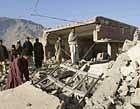
The Home Department of Punjab has set up the task forces comprising officials of the Crime Investigation Department, Special Branch and Anti-Terrorism Squad in several districts of the province, said a report by BBC Urdu.
The groups against which action will be taken include the JuD, LeT, Jaish-e-Mohammed, Lashkar-e-Jhangvi, Sipah-e- Sahaba, and Tehrik-e-Nifaz-e-Shariah Muhammadi, among others.
Nine of the groups belong to the hardline Deobandi sect, three are Shia organisations while three are influenced by the ideology of Ahl-e-Hadith.
The other groups on the list are Sipah-e-Muhammad Pakistan, Tehrik-e-Jafriya Pakistan, Millat-e-Islamiya Pakistan, Khudamul Islam, Islami Tehrik Pakistan, Hizb-ut- Tehrir, Jamiat-ul-Ansar, Jamiat-ul-Furqan, Khair-un-Naas International Trust, Islamic Students Movement and Balochistan Liberation Army.
The BLA is a Baloch nationalist group and the ISM is a radical students' organisation.
However, the Tehrik-e-Taliban Pakistan is not among the groups to be targeted by the task forces.
Interior Minister Rehman Malik has said the Taliban and al Qaida are working with the Lashkar-e-Jhangvi and Sipah-e-Sahaba in parts of the country, especially Punjab.
The Sunni Tehrik also has been placed under observation by the Home Department.
About 4,000 people are currently under surveillance under the provisions of the Anti-Terrorism Act for alleged links with extremist groups.
They have to inform police stations in their areas about their movements.
The task forces have been advised to establish close contact with intelligence officers in the districts to exchange information on the 17 organisations that will be the focus of the crackdown.
An official of the Punjab Home Department told BBC Urdu that orders had been issued to launch crackdowns on the hideouts of these groups and arrest those connected with them immediately.
The task forces have also been asked to trace those who are financing these groups and their other sources of funding so that action can be taken under the Anti-Terrorist Act.
The task forces led by district police chiefs will report to the Punjab Home Department.
Pressure is mounting on the Punjab government to crack down on militant groups in the province in the wake of the attack on Data Darbar shrine in which 45 people were killed.
Several leading Sunni groups have also demanded that provincial Law Minister Rana Sanaullah should be sacked for his alleged links with the Sipah-e-Sahaba.
The Punjab government and Interior Minister Rehman Malik have engaged in a war of words over the sharing of intelligence on possible terrorist attacks.
Malik has insisted that a "clear and specific" warning was issued to the Punjab government that terrorists could target mosques or other places of worship before the suicide attack on Data Darbar.
Former premier Nawaz Sharif, whose PML-N party rules Punjab, contended that intelligence and security agencies under the federal Interior Ministry were not sharing information with provincial authorities.